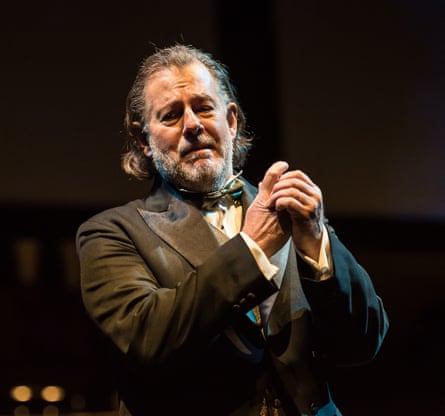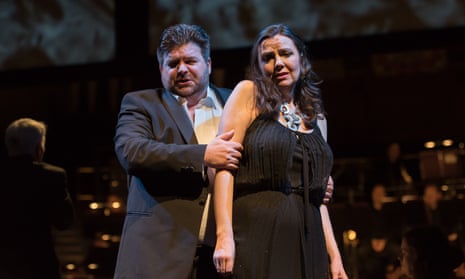In Die Walküre, second instalment of Wagner’s Ring cycle, the orchestra really comes into its own. It’s as though, in the course of writing Die Walküre, and particularly in Wotan’s farewell, Wagner discovers the orchestra’s capacity to drive the drama and its underlying ideas. It was a lesson Wagner was never to forget, so it was fitting that the Opera North orchestra, again authoritatively conducted by Richard Farnes, were the true heroes of this Festival Hall performance.
Having the orchestra on the platform for these semi-staged performances means major challenges of balance with the singers, but Farnes was consistently equal to them. At key moments this was one of the most intimate-sounding Walküres I have ever heard, most notably in Siegmund’s celebrated invocation of spring in act one, where Wagner’s fast-changing dynamics were attentively observed, with true orchestral and vocal pianissimos that one rarely hears in the usual stentorian renderings. It was another triumph of the preparation that so obviously marks these performances. Yet Farnes held nothing back when the score demands it.
As in Reginald Goodall’s legendary English-language Ring cycle at the then fledgling English National Opera in the 1970s (which I heard at the Coliseum for a total four-evening outlay of £3.60 – it was another world), the levels of preparation allow singers to give their properly rehearsed best. The standout beneficiary of this same approach here was soprano Lee Bisset, whose unforced vocal range and committed characterisation produced the most all-round compelling Sieglinde I have heard since the great Helga Dernesch.

Michael Weinius’s Siegmund was not quite in the same class, but he has a fine dark and ringing sound, was equal to the many demands of act one and didn’t milk the two cries of help to his father, Wälse, (in reality the god Wotan) as some do. His pre-death encounter with Kelly Cae Hogan’s Brünnhilde was spare and sombre, and another good example of the musical discipline that marks these performances. Hogan, in one of the few principal roles in this cycle which is not being shared, was on a similar level, her opening war cries right on the note without apparent strain or contrivance, and the act of disobedience to Wotan grippingly accomplished.
Robert Hayward brought a wealth of experience and insight to his Wotan, and the characterisation of the anguished god had many deft touches of humour and petulance as well. But the voice cannot conceal its vibrato or the tendency to bark the lines and, as with Yvonne Howard’s Fricka (less persuasive here than in Das Rheingold), one was conscious of the vocal artfulness in negotiating difficulties and limitations rather than living every moment with the music, as one could do with the younger principals. The excellent James Creswell added a fine Hunding to his fine Fasolt the previous evening.
The self-imposed limitations of the concert performance format, with the words and pictures projected on three screens behind the orchestra, felt more obvious and obtrusive in this second evening than in the busier demands of Das Rheingold the previous evening. But with the orchestra on such form, that did not matter as much as it may seem to by the end of the cycle.

Comments (…)
Sign in or create your Guardian account to join the discussion